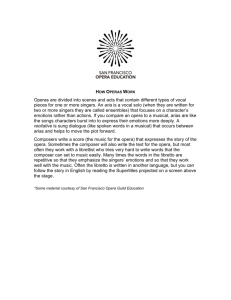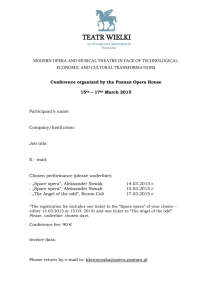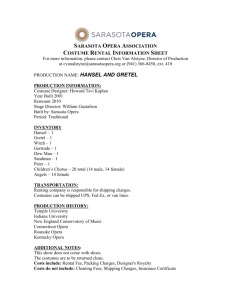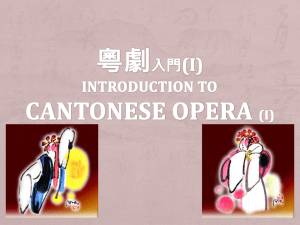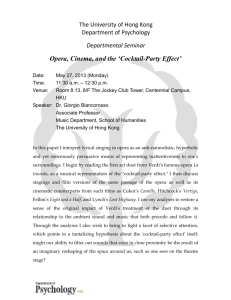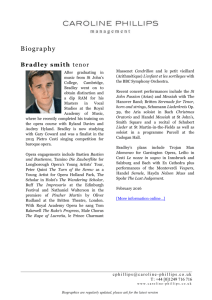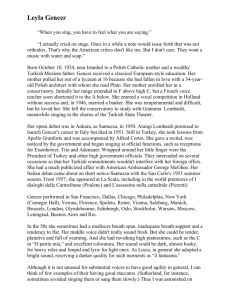Creating Your Own Curriculum
advertisement
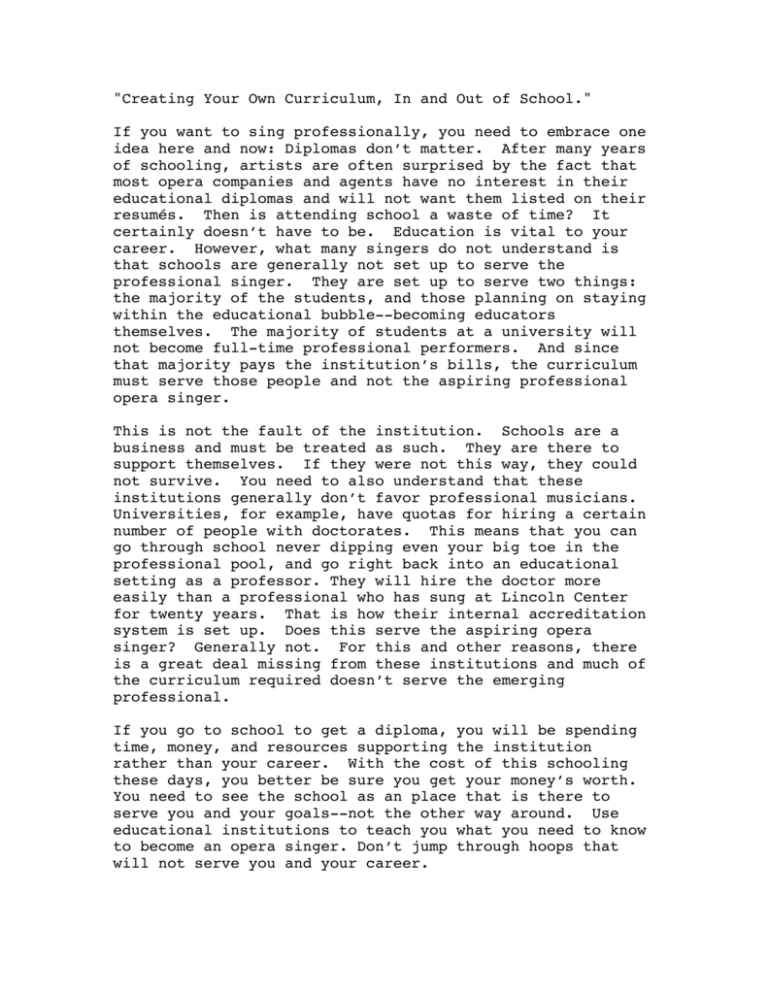
"Creating Your Own Curriculum, In and Out of School." If you want to sing professionally, you need to embrace one idea here and now: Diplomas don’t matter. After many years of schooling, artists are often surprised by the fact that most opera companies and agents have no interest in their educational diplomas and will not want them listed on their resumés. Then is attending school a waste of time? It certainly doesn’t have to be. Education is vital to your career. However, what many singers do not understand is that schools are generally not set up to serve the professional singer. They are set up to serve two things: the majority of the students, and those planning on staying within the educational bubble--becoming educators themselves. The majority of students at a university will not become full-time professional performers. And since that majority pays the institution’s bills, the curriculum must serve those people and not the aspiring professional opera singer. This is not the fault of the institution. Schools are a business and must be treated as such. They are there to support themselves. If they were not this way, they could not survive. You need to also understand that these institutions generally don’t favor professional musicians. Universities, for example, have quotas for hiring a certain number of people with doctorates. This means that you can go through school never dipping even your big toe in the professional pool, and go right back into an educational setting as a professor. They will hire the doctor more easily than a professional who has sung at Lincoln Center for twenty years. That is how their internal accreditation system is set up. Does this serve the aspiring opera singer? Generally not. For this and other reasons, there is a great deal missing from these institutions and much of the curriculum required doesn’t serve the emerging professional. If you go to school to get a diploma, you will be spending time, money, and resources supporting the institution rather than your career. With the cost of this schooling these days, you better be sure you get your money’s worth. You need to see the school as an place that is there to serve you and your goals--not the other way around. Use educational institutions to teach you what you need to know to become an opera singer. Don’t jump through hoops that will not serve you and your career. In addition, don’t create something to “fall back upon.” If you do, you will fall back upon that thing. Many fearmongers will try to entice you with this kind of occupational insurance. If you can be happy doing anything else, then do it. You will not be able to compete with those who know in their hearts that they must do this for a living. Professional opera singing takes a kind of obsessive behavior and singlemindedness that other professions don’t require. If you don’t have it, you won’t be ready to compete against those that do. If you are not sure, go ahead and get your diploma, frame it, and put it on your wall. If, on the other hand, you eat, sleep and drink opera, you need to get educated properly and not waste your time and money in supporting curriculums created by those who chose not to pursue fulltime careers. Don’t misunderstand, these institutions do provide valuable scholarship, research, and information. But most singers find that they learn more in one year singing professionally than they did in eight years of college. If you use schools, you ought to use them to get needed experience and information. However, it’s important that you develop your own curriculum that matches your goals, both in and out of school. So what do you need to learn exactly? What classes should you take? An extended list and explanations are in my book, Singing for your Supper. But for now, understand that you need to know the basics. Study voice above all else. Your time in the practice room is more important than getting good grades. When you audition, your singing is what people will care about (if they even look at your resume). Study piano intensively. Good musicians make good singers. Study theory, ear training, history, conducting, diction, opera literature (rarely offered), performance practice (unfortunately generally offered only to graduate students) and languages. When studying languages, study Italian, French and German until you are fluent. Don’t take the one required semester at your school. You need to speak these languages. With today’s competition, you also need extended acting classes, which are rarely required for voice majors. Grab every stage performing experience you can, including opera, oratorio, recitals and plays. The more you get up on stage, the better you will be. What should you avoid? Again, you need to be careful not to waste your time and precious money. Ask yourself if you really need a particular class. Yes, it may make you a better scholar, but will it get you jobs as a singer? Consider dumping classes on bibliography techniques, orchestration, form and analysis, twentieth century theory, and even art song literature and solfeggio. There are many arguments in favor of these things, but your choices depend on your personal goals. How many general education classes do you need? That depends on how well-rounded you want to be. You need to be able to function in society, but you cannot be all things to all people. Yes, you could stay in college forever studying wonderful things and becoming the smartest musician in the world. But that won’t get you on stage and it won’t get you a paid job. Stay away from choirs. Most institutions of higher learning are centered on choral programs and not opera programs. Many try to require your participation in their choirs as a major. Again, the institution does this to serve the most people. Remember, it is a business. However, most neglect the fact that choral singing and classical singing have different goals and utilize different vocal techniques. The main goal of choirs is to “instrumentalize” the voice. While violins, for example, are trying to add vibrato and portamento to their playing to imitate the natural human voice, choirs are trying to take out these two things to create better pitch and harmonic definition. They don’t support the true legato (portamento and in-between note singing), or the vibrato (the natural fluctuation in pitch), both of which promote vocal health. Don’t misunderstand. Choirs are great, as is their music. They just don’t serve you, as an opera singer, your time, or your money. Are there alternatives to colleges, universities and conservatories? You bet. In fact, with the cost of these institutions these days, sit down with a piece of paper and write down what it would cost to get privately tutored in all of your needed subjects by a professional. You may be surprised that you can pay for a private teacher, private acting coach, private theory teacher, or private language tutors for a lot less than a college education. In fact, this one-on-one time is usually better than a classroom experience. Sometimes, one person can teach you many of these things. You might even find a professional opera singer who will take you under his or her wing for the right price. Get out your paper and do the math. It’s your money. Once you are finished with college, then what? Is your education over? It should never be over. The minute you stop educating yourself your career will end--even if you sing at the big opera houses. You must continue to grow or you will simply get worse. People are usually going either up or down the ladder of the profession. Stagnation is more difficult that improvement. What do you do after college but before you start getting hired? Hire yourself. Ask yourself, what you would be doing and how you would be living your life if you were living the kind of life you desire. Live that life. Don’t ever say, “If you hire me at your big opera house then I’ll start behaving like someone who sings there.” People get hired there because they are already living that way. Don’t ask for a break. Make it obvious you deserve to be hired in the big houses. If you are out of work, hire yourself to sing the opera you really want to be hired to sing. Learn it like a pro. Stage it. Keep learning languages, studying and coaching on your own time. Make yourself so valuable, that companies cannot help but desire to hire you. There’s no doubt many of the ideas described here are radical and go against the flow. But professionals who have made it in the profession are known for having gone against the flow. They make their own decisions. They don’t study because it’s required by a curriculum or to get a grade. They study because they want to be the best at what they do. Now go hire yourself to become the best opera singer you can become. Dan Montez is General Director of Taconic Opera (taconicopera.org) in New York and is the author of Singing for Your Supper: What they Don’t Teach You In School About an Opera Career and Don’t Believe It!: How to follow your dreams in Spite of those who say you can’t.
